The Chamber of Petroleum Consumers (COPEC) has reiterated calls for the government to review taxes and levies on petroleum products to give respite to Ghanaians.
Mr Duncan Amoah, Executive Director, COPEC, explained in an interview that COPEC supported the demands of transport operators for the government to reduce the taxes because they were a major source of fuel price increment with the accompanying rippling consequences on the public.
The Coalition of Private Road Transport Operators on Tuesday, November 09, 2021, gave the government an ultimatum to reduce taxes on fuel, threatening to ground all commercial vehicles by 1500 hours Thursday, November 11, 2021.
The Unions, however, placed the intended strike on hold following a meeting with the Roads and Transport Ministry.
Mr Amoah said what constituted the final ex-pump prices were three key elements – Free On Board (FOB) price of the product or International Market Price, Forex and the taxes-, saying “With international market prices, the country has no control over it and while the Government has some relative control over forex, taxes are strictly Government decision and function.”
He said when fuel prices increased, Government was obviously unable to control the international market prices and stabilise the Cedi so, “there must be a focus on reducing the taxes on petroleum price build-up. That’s the only way out.”
“You can’t have a situation where all other factors are working against Government at the pumps and the taxes continue to be as high as they are,” he noted, saying, it was reasonable for the taxes to be reviewed immediately as had been demonstrated with the reduction in the Price Stabilisation and Recovery Levy.
The Executive Director said: “We fully endorse the approach of the transport unions and it’s our hope that authorities will listen and find a proper way in managing fuel prices….”
As a long-term proposal, Mr Amoah said the government needed to fix its strategic assets, including the revamping of the operations of the Tema Oil Refinery, adding that for a country that produced oil in commercial quantities, the Bulk Oil Storage and Transportation (BOST), for instance, needed to be revamped for the country to have a strategic stock at every point in time.
He said that was the only way to give the “country petroleum security, stabilise and cushion pump prices.”
















